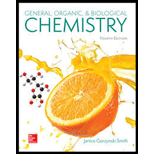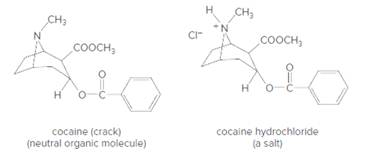
General, Organic, and Biological Chemistry - 4th edition
4th Edition
ISBN: 9781259883989
Author: by Janice Smith
Publisher: McGraw-Hill Education
expand_more
expand_more
format_list_bulleted
Concept explainers
Textbook Question
Chapter 11, Problem 88CP
Cocaine is a widely abused, addicting drug. Cocaine is usually obtained as its hydrochloride salt (cocaine hydrochloride, an ionic salt). This salt can be converted to crack (a neutral molecule) by treatment with base.

- Identify the
functional groups in cocaine. - Given what you have learned about ionic and covalent bonding, which of the two compounds—crack or cocaine hydrochloride—has a higher boiling point?
- Which compound is more soluble in water?
- Can you use the relative solubility to explain why crack is usually smoked but cocaine hydrochloride is injected directly into the bloodstream?
Expert Solution & Answer
Want to see the full answer?
Check out a sample textbook solution
Students have asked these similar questions
Enema nuclear forces determine many physical properties for organic chemicals. What is the reason ethylene glycol  has a much higher boiling main point than acetone?
In terms of organic chemistry how do you know if an atom has ionic bonds or covalent bonds and how do you know if it has just one of these or if it has both? Could you provide some examples of what an ionic bond looks like, covalent bond looks like, and what an atom would look like with both of these?
The following molecules only have a single functional group. Identify to which class of organic compounds each molecule belongs based on its functional group.
Chapter 11 Solutions
General, Organic, and Biological Chemistry - 4th edition
Ch. 11.1 - Prob. 11.1PCh. 11.2 - Fill in all H's and lone pairs in each compound.Ch. 11.3 - Prob. 11.2PPCh. 11.3 - Prob. 11.2PCh. 11.3 - Prob. 11.3PCh. 11.3 - Prob. 11.3PPCh. 11.3 - How many lone pairs are present in lidocaine, the...Ch. 11.4 - Convert each compound to a condensed formula.Ch. 11.4 - Convert each condensed formula to a complete...Ch. 11.4 - Convert each skeletal structure to a complete...
Ch. 11.4 - Prob. 11.5PCh. 11.4 - How many H’s are bonded to each indicated carbon...Ch. 11.4 - Using the skeletal structure, determine the...Ch. 11.5 - Prob. 11.7PCh. 11.5 - Prob. 11.8PCh. 11.5 - For each compound. [1] Identify the functional...Ch. 11.5 - How do a carboxylic acid and an alcohol differ?...Ch. 11.5 - Label each of the following condensed structures...Ch. 11.5 - Prob. 11.11PCh. 11.5 - Prob. 11.12PCh. 11.5 - Identify all of the functional groups in atenolol,...Ch. 11.5 - Prob. 11.13PCh. 11.5 - Prob. 11.10PPCh. 11.5 - Prob. 11.14PCh. 11.6 - Indicate the polar bonds in each compound. Label...Ch. 11.6 - Prob. 11.11PPCh. 11.6 - Prob. 11.16PCh. 11.6 - Predict the water solubility of each compound.Ch. 11.6 - Prob. 11.17PCh. 11.7 - Prob. 11.18PCh. 11.7 - Prob. 11.19PCh. 11.7 - Prob. 11.20PCh. 11 - Prob. 21PCh. 11 - Prob. 22PCh. 11 - Complete each structure by filling in all H’s and...Ch. 11 - Complete the structure of mepivacaine by filling...Ch. 11 - Prob. 25PCh. 11 - Prob. 26PCh. 11 - Prob. 27PCh. 11 - Prob. 28PCh. 11 - “Ecstasy” is a widely used illegal stimulant....Ch. 11 - Prob. 30PCh. 11 - Explain why each C—C—C bond angle in benzene...Ch. 11 - Prob. 32PCh. 11 - Convert each compound to a condensed structure.Ch. 11 - Convert each compound to a condensed structure.Ch. 11 - Convert each compound to a skeletal structure.Ch. 11 - Convert each compound to a skeletal structure.Ch. 11 - Convert each shorthand structure to a complete...Ch. 11 - Convert each shorthand structure to a complete...Ch. 11 - Convert each skeletal structure to a complete...Ch. 11 - Convert each skeletal structure to a complete...Ch. 11 - A and B are ball-and-stick models of two compounds...Ch. 11 - Prob. 42PCh. 11 - What is wrong in each of the following shorthand...Ch. 11 - Prob. 44PCh. 11 - Prob. 45PCh. 11 - Albuterol (trade names Proventil and Ventolin) is...Ch. 11 - Prob. 47PCh. 11 - Prob. 48PCh. 11 - Prob. 49PCh. 11 - (a) Identify the functional groups in donepezil,...Ch. 11 - Prob. 51PCh. 11 - GHB is an addictive, illegal recreational drug...Ch. 11 - Prob. 53PCh. 11 - Prob. 54PCh. 11 - Prob. 55PCh. 11 - Prob. 56PCh. 11 - Prob. 57PCh. 11 - (a) Identify the functional groups in venlafaxine,...Ch. 11 - You are given two unlabeled bottles of solids, one...Ch. 11 - State how potassium iodide (KI) and pentane...Ch. 11 - The given beaker contains 100 mL of the organic...Ch. 11 - Prob. 62PCh. 11 - Why do we need to know the shape of a molecule...Ch. 11 - 1,1-Dichloroethylene (CH2=CCl2) is a starting...Ch. 11 - Indicate the polar bonds in each molecule. Label...Ch. 11 - Indicate the polar bonds in each molecule. Label...Ch. 11 - Classify each molecule as polar or nonpolar.Ch. 11 - Classify each molecule as polar or nonpolar. a....Ch. 11 - Which molecule is more water soluble? Explain.Ch. 11 - Explain why pantothenic acid, vitamin B5, is water...Ch. 11 - Prob. 71PCh. 11 - Prob. 72PCh. 11 - Explain why regularly taking a large excess of a...Ch. 11 - You can obtain the minimum daily requirement of...Ch. 11 - Prob. 75PCh. 11 - Vitamin B6 is obtained by eating a diet that...Ch. 11 - Prob. 77PCh. 11 - Can an oxygen-containing organic compound, have...Ch. 11 - Prob. 79PCh. 11 - Prob. 80PCh. 11 - Benzocaine is the active ingredient in topical...Ch. 11 - Methyl salicylate is responsible for the...Ch. 11 - Answer the following questions about aldosterone,...Ch. 11 - Answer the following questions about...Ch. 11 - Prob. 85PCh. 11 - Skin moisturizers come in two types, (a) One type...Ch. 11 - THC is the active component in marijuana (Section...Ch. 11 - Cocaine is a widely abused, addicting drug....
Knowledge Booster
Learn more about
Need a deep-dive on the concept behind this application? Look no further. Learn more about this topic, chemistry and related others by exploring similar questions and additional content below.Similar questions
- How many electron pairs are shared when a triple bond exists between two carbon atoms? What must he the geometric arrangement around the carbon atoms in a triple bond? Draw the Lewis structure of a simple molecule that contains a triple bond.arrow_forwardWhat does a functional group do in an organic molecule?arrow_forward"Cyclohexene is a linear molecule with 6 carbon Describe the molecule cyclohexene and provide the chemical formula. atoms and 12 hydrogen atoms. There is a triple bond because it ends in - # 4 (Glycerina) ene. The chemical formula is C6H12" Which two functional groups are in the molecule shown below? Use the terms left and right to distinguish them. "The left functional group is a carboxylic acid. The right functional group is an #5 (Trinitress) alcohol." Harrow_forward
- The molecular formula of N-methylacrylamide is C4H7ON. How many valence electrons are needed to draw the Lewis structure of this molecule? Also, Draw the Lewis structure of N-methylacrylamide based on the skeleton above. Which is/are the intermolecular force(s) present between molecules of N-methylacrylamide?arrow_forward* Question Completion Status: A Moving to the next question prevents changes to this answer. Question 2 Identify the functional group HO NH₂ ester amine amide alcohol phenol alkene ketone sulfide A Moving to the next question prevents changes to this answer. ✓, and in the following compound.arrow_forwardCarboxylic acid functional groups can be part of the parent chain of a molecule. This means that the carbon atom in the functional group is also part of the main carbon chain. However, carboxylic acid functional groups can also branch off the main chain. The following example contains both types of carboxylic acid functional groups. Draw the structure in bond-line notation. HOOCCH2CH(COOH)CH2COOHarrow_forward
- Amines and amides both contain nitrogen. What are the differences in the structures of amines and amides in terms of the functional groups?arrow_forwardIn the structure of Methamphetamine. What functional groups are in the molecule?arrow_forward23. Suppose that you are working with four unknown compounds in a chemistry laboratory. Your teacher tells you that these compounds are alkane, alcohol, ester and organic acid. Use the table of physical properties shown below to identify each unknown compound. Compound A is Compound C is Compound Boiling point A B C D -89°C 77°C Odour 118°C Odourless Sweet 78°C Sharp, antiseptic Very polar smell Molecular polarity Non-polar Polar Sharp, vinegar smell Very polar Compound B is Compound D isarrow_forward
- Dopamine, a molecule synthesized by nerve cells in the brain, affects movement, emotions, and pleasure. When dopamine-producing nerve cells die, Parkinson’s disease results. Identify the functional groups in dopamine.arrow_forwardHow does the structure of an alcohol differ from an ether? Describe how an aldehyde differs in structure from a ketone. Thiols are compounds which resemble alcohols, except that the oxygen atom is replaced by a sulfur atom. Draw the analogous thiol for the four carbon alcohol in Table 1. Describe the structural difference between carboxylic acids and esters. Are ethers polar molecules? Would you expect ethers to have higher or lower boiling points than alkanes (circle one)? Explain. Pentane (an alkane) has a boiling point of 36 °C. Does the data agree with your prediction? explain why this could be the casearrow_forwardWhat are functional groups? Why is it logical and useful to classify organic compounds according to their functional groups?arrow_forward
arrow_back_ios
SEE MORE QUESTIONS
arrow_forward_ios
Recommended textbooks for you
 Introductory Chemistry: A FoundationChemistryISBN:9781337399425Author:Steven S. Zumdahl, Donald J. DeCostePublisher:Cengage Learning
Introductory Chemistry: A FoundationChemistryISBN:9781337399425Author:Steven S. Zumdahl, Donald J. DeCostePublisher:Cengage Learning Introductory Chemistry: An Active Learning Approa...ChemistryISBN:9781305079250Author:Mark S. Cracolice, Ed PetersPublisher:Cengage Learning
Introductory Chemistry: An Active Learning Approa...ChemistryISBN:9781305079250Author:Mark S. Cracolice, Ed PetersPublisher:Cengage Learning Living By Chemistry: First Edition TextbookChemistryISBN:9781559539418Author:Angelica StacyPublisher:MAC HIGHER
Living By Chemistry: First Edition TextbookChemistryISBN:9781559539418Author:Angelica StacyPublisher:MAC HIGHER

Introductory Chemistry: A Foundation
Chemistry
ISBN:9781337399425
Author:Steven S. Zumdahl, Donald J. DeCoste
Publisher:Cengage Learning

Introductory Chemistry: An Active Learning Approa...
Chemistry
ISBN:9781305079250
Author:Mark S. Cracolice, Ed Peters
Publisher:Cengage Learning

Living By Chemistry: First Edition Textbook
Chemistry
ISBN:9781559539418
Author:Angelica Stacy
Publisher:MAC HIGHER
Lipids - Fatty Acids, Triglycerides, Phospholipids, Terpenes, Waxes, Eicosanoids; Author: The Organic Chemistry Tutor;https://www.youtube.com/watch?v=7dmoH5dAvpY;License: Standard YouTube License, CC-BY